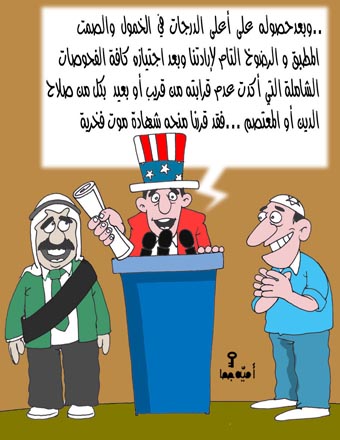Yemen Times,
Yemen
Disunity Makes Possible U.S. and Israeli Occupation
By Abdulbari Taher 
July 31 - August 2 Issue
Yemen - Original Article (English)

 'The Bush Vision for the New and Different Middle East!'
'The Bush Vision for the New and Different Middle East!'
[Alquds, U.K.]. (above)
'Zionist-Controlled Politicians in U.S.-E.U. repeat non-stop:
''Israel has the right to defend itself,'' while Israeli terrorist
air strikes continue to kill civilians in Lebanon and Palestine.'
[Ad Dustour, Jordan]. (below)

-------------------------------------------------------------------------
What is happening in Palestine and Iraq
today are war crimes. The American occupation in Iraq is responsible for a war
of annihilation and the destruction of a civilization. In occupied Palestine,
there is an Israeli government, and its Zionists - both right-wing and left-wing
- are responsible for the same unspeakable crimes.
The barbaric and annihilating war
in Iraq matches anything that occured during medieval times, and what is occurring in
Palestine renews the catastrophe of the holocaust, and actually rather exceeds
it.
What's more, the unsightly colonialist
war in Iraq and the racist ethnic cleansing in Palestine are taking place
amidst a deafening international silence. Out of this mass destruction, there
arise a number of questions. Does one dominant power have the right to impose its
will on other nations? Do the criminal events of September 11 justify
silence over these crimes? Does the internal split in Palestine [between Hamas
and Fatah] and the sectarian divide in Iraq speak to the negligence of the
international community and human rights organizations? Does weakness and
defeatism to an extent extinguish the need to ask these questions?
What is most tragic is the change in the
global community's stance in general, and that of the Arab world in particular.
Most nations, especially in Europe, were at least distinguishable from the
Americans, and were sympathetic to some extent toward war victims and against
occupation and ethnic cleansing. Europe at least appeared to lean toward peace.
As for the Arab elite, it has turned its back on what's going on in Iraq and
Palestine. Instead, it is preoccupied with internal squabbling and is incapable
of doing anything, even of uttering a nominal condemnation.
The Israeli press and statements by senior
Israeli officials have begun to cite the favorable Arab silence. They talk of
the official Arab stance as though it supports Israel in its war of
annihilation against the Palestinians. Moreover, some Arab governments are pressuring
the Palestinians as if they were the aggressors, as if they ought to concede.
But none of this should indicate that Arab
regimes are blind to sectarian divisions in Iraq and Palestine. The factional
differences, which have led to fighting between two antagonistic sides [Hamas
and Fatah], creates a climate and pretexts for outside interference In
Palestine that weaken international and Western
sympathy, which historically favors the Israeli state.
In Iraq, the sectarian divisions have
allowed the Americans to play the Sunni-Shiite card, giving it cover to
prolong the war and destroy any trace of Iraqi identity, tearing to pieces a
historically united people. It would be naive to diminish these sectarian differences
which have existed since ancient times, but such differences didn't prevent the
crystallization of Iraqi civilization, and didnít lead to conflict until the colonialist
invasions [the Crusades]. In fact, attempts to inflame these differences have
historically failed, for example during the Mongol and Tatar invasions  and even during the British occupation
and even during the British occupation  , which failed to
"divide and rule" despite its political cunning and colonialist
experience. It was incapable of remaining in the land of Mesopotamia.
, which failed to
"divide and rule" despite its political cunning and colonialist
experience. It was incapable of remaining in the land of Mesopotamia.
 'The U.S. awards Arab rulers a diploma in submission.'
'The U.S. awards Arab rulers a diploma in submission.'
[Alhayat Aljadeeda, Palestine].
-----------------------------------------------------------
The differences between Fatah and Hamas
are political, and could be resolved were it not for the Israeli war of
annihilation that seeks to destroy the will of the Palestinian people, diminish
them as a nation, and strip them of their national and legitimate rights.
The most pressing issues now are to heal
the internal wounds in both Iraq and Palestine and to help them reach national accords,
which would repel the colonialist occupation of Iraq and the ethnic cleansing
in Palestine. There is a direct correlation between the situation in these two
nations. What happens in Iraq influences the situation in Palestine and vise
versa.
Israel may understand better than the
Bush Administration that the American military defeat in Iraq is inevitable. That
is why Washington is in a race against time, trying to impose a fait
accompli and dismember what remains of the land of Palestine so as to
make building a Palestinian state impossible.
Abdulbari Taher is a Yemeni journalist
and a former chairman of the Yemeni Journalists Syndicate.
VIDEO FROM YEMEN: THE PRESIDENT OF YEMEN
OFFERS ASSISTANCE TO THE ENEMIES OF ISRAEL
 AL-JAZEERA, from Yemen: excerpts from an interview with President of Yemen, Ali Abdallah Saleh, who urges Arab assistance to Hezbullah and Syria's entry into the war, August 1, 00:04:24, MEMRI
AL-JAZEERA, from Yemen: excerpts from an interview with President of Yemen, Ali Abdallah Saleh, who urges Arab assistance to Hezbullah and Syria's entry into the war, August 1, 00:04:24, MEMRI
"I hope that all the countries bordering with Israel, not just Syria, would enter the war. I meant the countries bordering with Israel. We will not enter the war officially, but we will open the borders to the fighters. We will allow the transfer of money and equipment, to support the Lebanese resistance and the Palestinian resistance in Gaza."
 President of Yemen, Ali Abdallah Saleh
President of Yemen, Ali Abdallah Saleh